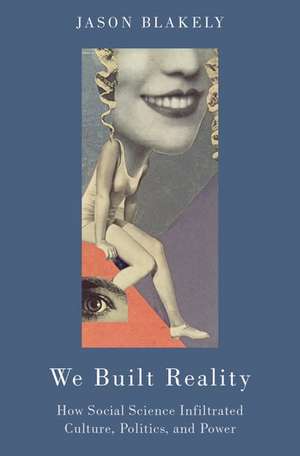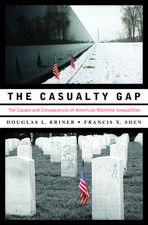We Built Reality: How Social Science Infiltrated Culture, Politics, and Power
Autor Jason Blakelyen Limba Engleză Paperback – 24 iul 2020
Preț: 170.07 lei
Preț vechi: 198.27 lei
-14% Nou
Puncte Express: 255
Preț estimativ în valută:
32.54€ • 33.98$ • 26.93£
32.54€ • 33.98$ • 26.93£
Carte disponibilă
Livrare economică 03-10 martie
Preluare comenzi: 021 569.72.76
Specificații
ISBN-13: 9780190087388
ISBN-10: 0190087382
Pagini: 184
Dimensiuni: 135 x 206 x 13 mm
Greutate: 0.23 kg
Editura: Oxford University Press
Colecția OUP USA
Locul publicării:New York, United States
ISBN-10: 0190087382
Pagini: 184
Dimensiuni: 135 x 206 x 13 mm
Greutate: 0.23 kg
Editura: Oxford University Press
Colecția OUP USA
Locul publicării:New York, United States
Recenzii
[Jason Blakely] achieves something quite remarkable in this little book. He convincingly makes an ambitious argument which has significant implications for how we consider the role of expertise, narrative, and ideology across our societies ... I would encourage everyone interested in social policy particularly or social science generally to read this book. It will provoke fruitful thinking and open up new perspectives.
We Built Reality reads smoothly and quickly, in part, because rather than retreating into dry neutrality Blakely takes up the storyteller's mantle and offers us a curated cultural map of the created crises of our present age.
In We Built Reality, Blakely distills and applies his prior, more theoretical work into a powerful indictment of those social scientists who claim to be more "objective" and "reality-based" than work like Rosa's value-laden account of resonance.
Blakely's lively and impassioned prose is a revelation, popularizing critical social science. He compiles the subtle and not-so-subtle ways in which we are persuaded to see ourselves, and society as a whole, as mechanical objects in need of expert guidance and manipulation, rather than as reflective agents narrating a past and imagining a better future... [his book] should be at the foundation of a new, more generous, view of our nature, destiny, and purpose.
Blakely's is an acute and ominous analysis of the ways in which the understandable prestige of the hard sciences in modern culture has, alas, been accompanied by an unwholesome parasitism, by which the authority of scientific method has been conscripted into the service of insidious forms of fraudulent and often destructive 'expertise.
This book is an essential contribution and absolutely must be read widely. It explains what's wrong with attempts to explain human action and culture with reductive theories modelled after mechanistic natural science. It is not just that these explanations don't work; it is also that simplistic versions of these theories are accepted as valid self-descriptions by many. The resulting changes in self-understanding can do a lot of damage. Witness the role of the notion of 'economic man' in the financial disaster of 2008. But Blakely gives many other examples.
We Built Reality is worth considering for its illumination of the ways in which so much ground-breaking social science ultimately leads not to a broader understanding but a narrower reimagining of humanity.
We Built Reality reads smoothly and quickly, in part, because rather than retreating into dry neutrality Blakely takes up the storyteller's mantle and offers us a curated cultural map of the created crises of our present age.
In We Built Reality, Blakely distills and applies his prior, more theoretical work into a powerful indictment of those social scientists who claim to be more "objective" and "reality-based" than work like Rosa's value-laden account of resonance.
Blakely's lively and impassioned prose is a revelation, popularizing critical social science. He compiles the subtle and not-so-subtle ways in which we are persuaded to see ourselves, and society as a whole, as mechanical objects in need of expert guidance and manipulation, rather than as reflective agents narrating a past and imagining a better future... [his book] should be at the foundation of a new, more generous, view of our nature, destiny, and purpose.
Blakely's is an acute and ominous analysis of the ways in which the understandable prestige of the hard sciences in modern culture has, alas, been accompanied by an unwholesome parasitism, by which the authority of scientific method has been conscripted into the service of insidious forms of fraudulent and often destructive 'expertise.
This book is an essential contribution and absolutely must be read widely. It explains what's wrong with attempts to explain human action and culture with reductive theories modelled after mechanistic natural science. It is not just that these explanations don't work; it is also that simplistic versions of these theories are accepted as valid self-descriptions by many. The resulting changes in self-understanding can do a lot of damage. Witness the role of the notion of 'economic man' in the financial disaster of 2008. But Blakely gives many other examples.
We Built Reality is worth considering for its illumination of the ways in which so much ground-breaking social science ultimately leads not to a broader understanding but a narrower reimagining of humanity.
Notă biografică
Jason Blakely is Associate Professor of Political Science at Pepperdine University. He is the author of Alasdair MacIntyre, Charles Taylor, and the Demise of Naturalism and, with Mark Bevir, of Interpretive Social Science (Oxford).


















